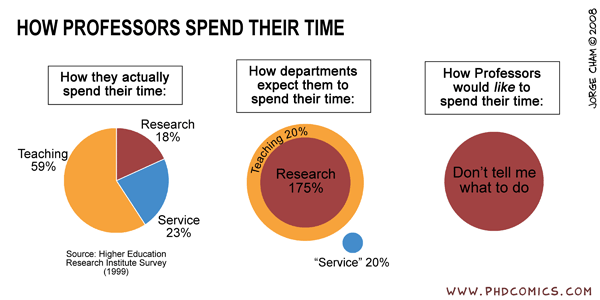I'm done with my first week of grad school and I've noticed professors don't seem to do a whole lot of work.
Teach Undergrad Classes - They get TAs to grade their papers, run exams over to be electronically graded, input scores in the online site, meet with students to discuss grades and class material, etc. Sure, they have to prepare a lecture, but if you do that once, you're good to go. Some even use PowerPoint slides book manufacturers send them, so that's no work.
Teach Grad Classes - Most of these classes are discussion-based. There are a few papers, but with class sizes ranging from 6-15, grading those is hardly difficult.
Research - They get grants, then deploy undergraduates to collect the data, enter data in SPSS, etc. They have grad students cranking out papers and posters, then they just attach their name to those papers and posters.
They need to read and correct their students' drafts, but since they only have 1-3 graduate students at any given time, this is no brain buster either.
I'm not complaining. It's a good learning experience to do all that work, no doubt, but being a professor doesn't seem ridiculously hard when they have everyone else doing their work for them. In fact, it seems like a good position to have since tenured profs make $80,000-$120,000 a year. I think I found my new career aspiration.
I'd also have to say clinical psychology students are underpaid given the amount of work we do. $25,000 minimum would be a good salary.
Thoughts?
Great board BTW. I wish I'd found it when I was applying.
Jason
Teach Undergrad Classes - They get TAs to grade their papers, run exams over to be electronically graded, input scores in the online site, meet with students to discuss grades and class material, etc. Sure, they have to prepare a lecture, but if you do that once, you're good to go. Some even use PowerPoint slides book manufacturers send them, so that's no work.
Teach Grad Classes - Most of these classes are discussion-based. There are a few papers, but with class sizes ranging from 6-15, grading those is hardly difficult.
Research - They get grants, then deploy undergraduates to collect the data, enter data in SPSS, etc. They have grad students cranking out papers and posters, then they just attach their name to those papers and posters.
They need to read and correct their students' drafts, but since they only have 1-3 graduate students at any given time, this is no brain buster either.
I'm not complaining. It's a good learning experience to do all that work, no doubt, but being a professor doesn't seem ridiculously hard when they have everyone else doing their work for them. In fact, it seems like a good position to have since tenured profs make $80,000-$120,000 a year. I think I found my new career aspiration.
I'd also have to say clinical psychology students are underpaid given the amount of work we do. $25,000 minimum would be a good salary.
Thoughts?
Great board BTW. I wish I'd found it when I was applying.
Jason

